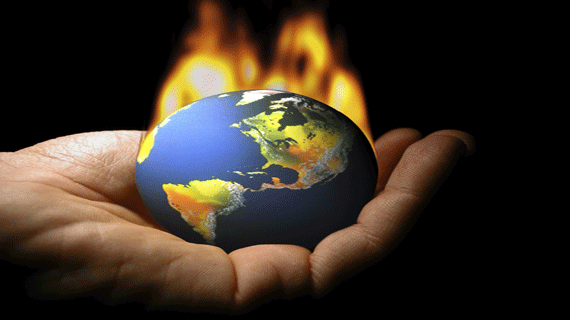
That Africa is vulnerable to climate change is indisputable. Recent observable effects of this phenomenon in the region include; great water stress, extremities in temperatures, multiple changes in weather patterns, floods, cyclones, to mention only but a few. Of serious concern, is that great water stress and seasonal shifts in weather patterns have resulted in recurrent droughts.
By Proceed Manatsa
Additionally, extremities in temperatures have brought about new vector-borne diseases as well as heat-related illnesses such as skin cancer. Moreover, floods and cyclones have left a trail of destruction. Not only have they affected human life, but also domestic animals, wildlife, crops, infrastructural facilities such as roads, communication networks and power lines.
With regards to the causes of climate change, many are generally agreed that the highly-industrialised countries, with a long history of fossil fuel use have emitted the largest stake of Green House Gases (GHGs) which are believed to be the major cause of global warming, and hence climate change. It is for this reason that the developing countries (including those from Africa) have argued that the industrialised nations should take the lead in addressing climate change.
Conversely, the developed countries have denied sole responsibility arguing that climate change intervention measures should be universal. Such ideological differences have over the years sparked debates between the North and the South (developed and developing) over how climate change intervention measures should be undertaken.
To this effect, efforts to address climate change have hit a brick wall as these two camps have been embroiled in political rancour over who should take the lead in addressing the problem. Thus far, the developed and developing countries are deadlocked.
Whilst the Northern countries are to blame for current atmospheric mess, they, however, boast vibrant economies and financial resources to insulate themselves from the vagaries of climate change. Yet, the South, particularly those from Africa, lack the resources needed to protect themselves from the adversities of climate change.
Furthermore, these poor nations are hit-worst by the side effects of climate change regardless of the fact that they contribute the least to the problem. The situation is exacerbated by the socio-economic and developmental challenges the continent is facing at the present moment.
- Chamisa under fire over US$120K donation
- Mavhunga puts DeMbare into Chibuku quarterfinals
- Pension funds bet on Cabora Bassa oilfields
- Councils defy govt fire tender directive
Keep Reading
In view of the foregoing, Africa should be mindful of the fact that it is one of the continents that are affected most by climate change. Africa should, therefore, rethink and reflect on its position with regards to climate action. It does not help the continent to continue pressing and bargaining for the developed countries to take the lead in addressing climate change when it’s continually wallowing in serious climatic adversities.
While Africa is facing socio-economic and developmental problems, it is critical that the continent adopt a forward-looking, co-ordinated legal framework that is aimed at harmonising the laws and policies of the region on climate change adaptation and mitigation.
The envisaged law should be one that is geared towards the application of a climate lens in law and policy formulation, planning and regulatory programmes that assimilate climate change issues into sectoral strategies.
Africa should seize the opportunity of the Paris Conference on Climate Change in December 2015, to raise its concerns on climate change issues. Of late, it is noteworthy that most African countries have for the very first time committed themselves to binding climate mitigation commitments by submitting their Intended Nationally Determined Contributions (INDCs) to the United Nations Framework Convention on Climate Change (UNFCCC) Secretariat.
INDCs refers to national pledges by States and are reflective of what they plan to do in future to combat climate change and the UNFCCC Secretariat is a United Nations body whose remit is to receive such INDCs from member States.
Examples of African countries that submitted their INDCs as of the October 1, 2015 deadline include; Zimbabwe, Zambia, Kenya, South Africa, Lesotho, Tanzania, Guinea Bissau, Rwanda, Ivory Coast, Malawi, Swaziland. Inasmuch as these African countries are keen to address climate change, most of them have indicated in their INDCs that they still face structural barriers that can stall the momentum going forward.
One of key barriers that cut across the board is lack of funding to implement climate change mitigation measures. To this end, the developed countries are urged to chip in and give technical and financial support to the developing countries to enable them to mollify the adverse effects of climate change.
However, even if the developed countries are to pooh-pooh the obligation to provide financial assistance, African countries should not use the former’s inaction as a scapegoat for backing off from their INDCs. Suffice to say that Africa should use its meagre resources to bankroll its climate change mitigation programmes.
For if not so, climate change will continue to devour Africa. Yet, those that would have caused the problem would have backed off, watching and laughing from a distance. All this leads to an inescapable conclusion that time is now for Africa to rethink and reflect on the past, as the basis for future action on climate mitigation.
Proceed Manatsa is a Registered Legal Practitioner with the High Court of Zimbabwe. He is currently studying towards a Master of Laws in Environmental Law and his thesis is on Climate Change Law and Policy. He writes in his personal capacity and can be contacted on [email protected]










